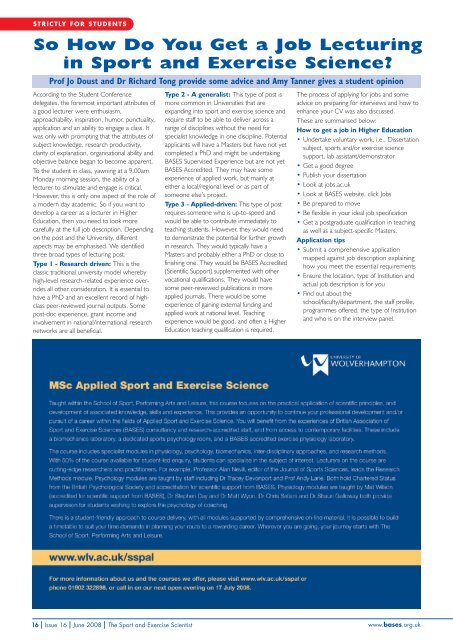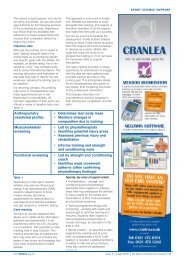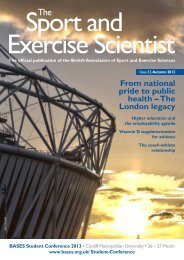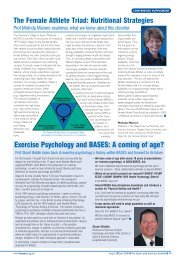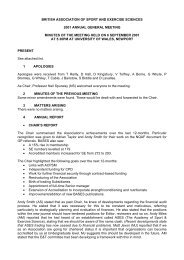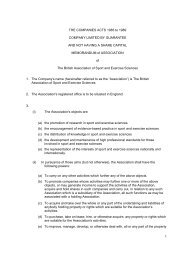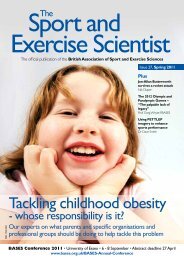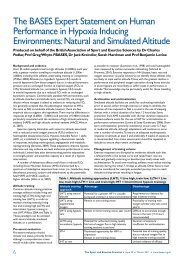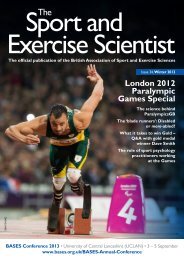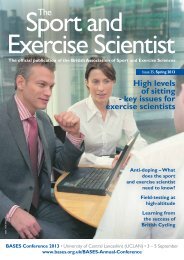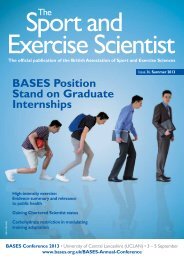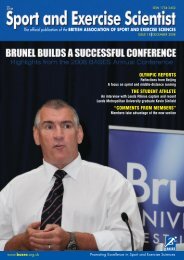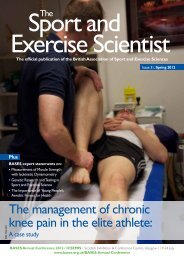Part 1 - Bases
Part 1 - Bases
Part 1 - Bases
- No tags were found...
Create successful ePaper yourself
Turn your PDF publications into a flip-book with our unique Google optimized e-Paper software.
STRICTLY FOR STUDENTSSo How Do You Get a Job Lecturingin Sport and Exercise Science?Prof Jo Doust and Dr Richard Tong provide some advice and Amy Tanner gives a student opinionAccording to the Student Conferencedelegates, the foremost important attributes ofa good lecturer were enthusiasm,approachability, inspiration, humor, punctuality,application and an ability to engage a class. Itwas only with prompting that the attributes ofsubject knowledge, research productivity,clarity of explanation, organisational ability andobjective balance began to become apparent.To the student in class, yawning at a 9.00amMonday morning session, the ability of alecturer to stimulate and engage is critical.However, this is only one aspect of the role ofa modern day academic. So if you want todevelop a career as a lecturer in HigherEducation, then you need to look morecarefully at the full job description. Dependingon the post and the University, differentaspects may be emphasised. We identifiedthree broad types of lecturing post.Type 1 - Research driven: This is theclassic traditional university model wherebyhigh-level research-related experience overridesall other consideration. It is essential tohave a PhD and an excellent record of highclasspeer-reviewed journal outputs. Somepost-doc experience, grant income andinvolvement in national/international researchnetworks are all beneficial.Type 2 - A generalist: This type of post ismore common in Universities that areexpanding into sport and exercise science andrequire staff to be able to deliver across arange of disciplines without the need forspecialist knowledge in one discipline. Potentialapplicants will have a Masters but have not yetcompleted a PhD and might be undertakingBASES Supervised Experience but are not yetBASES Accredited. They may have someexperience of applied work, but mainly ateither a local/regional level or as part ofsomeone else’s project.Type 3 - Applied-driven: This type of postrequires someone who is up-to-speed andwould be able to contribute immediately toteaching students. However, they would needto demonstrate the potential for further growthin research. They would typically have aMasters and probably either a PhD or close tofinishing one. They would be BASES Accredited(Scientific Support) supplemented with othervocational qualifications. They would havesome peer-reviewed publications in moreapplied journals. There would be someexperience of gaining external funding andapplied work at national level. Teachingexperience would be good, and often a HigherEducation teaching qualification is required.The process of applying for jobs and someadvice on preparing for interviews and how toenhance your CV was also discussed.These are summarised below:How to get a job in Higher Education• Undertake voluntary work, i.e., Dissertationsubject, sports and/or exercise sciencesupport, lab assistant/demonstrator• Get a good degree• Publish your dissertation• Look at jobs.ac.uk• Look at BASES website, click Jobs• Be prepared to move• Be flexible in your ideal job specification• Get a postgraduate qualification in teachingas well as a subject-specific Masters.Application tips• Submit a comprehensive applicationmapped against job description explaininghow you meet the essential requirements• Ensure the location, type of Institution andactual job description is for you• Find out about theschool/faculty/department, the staff profile,programmes offered, the type of Institutionand who is on the interview panel.16 l Issue 16 l June 2008 l The Sport and Exercise Scientistwww.bases.org.uk


